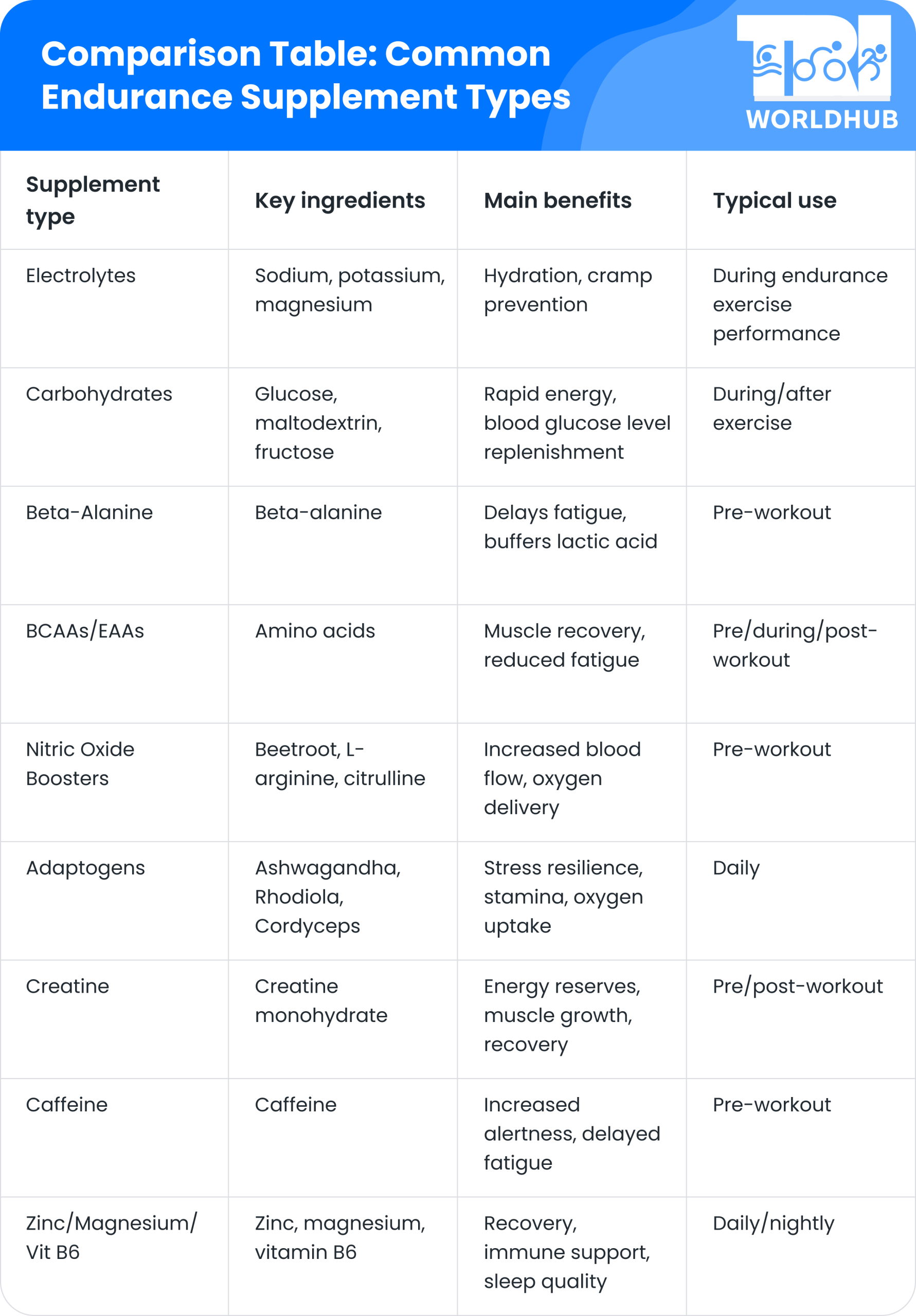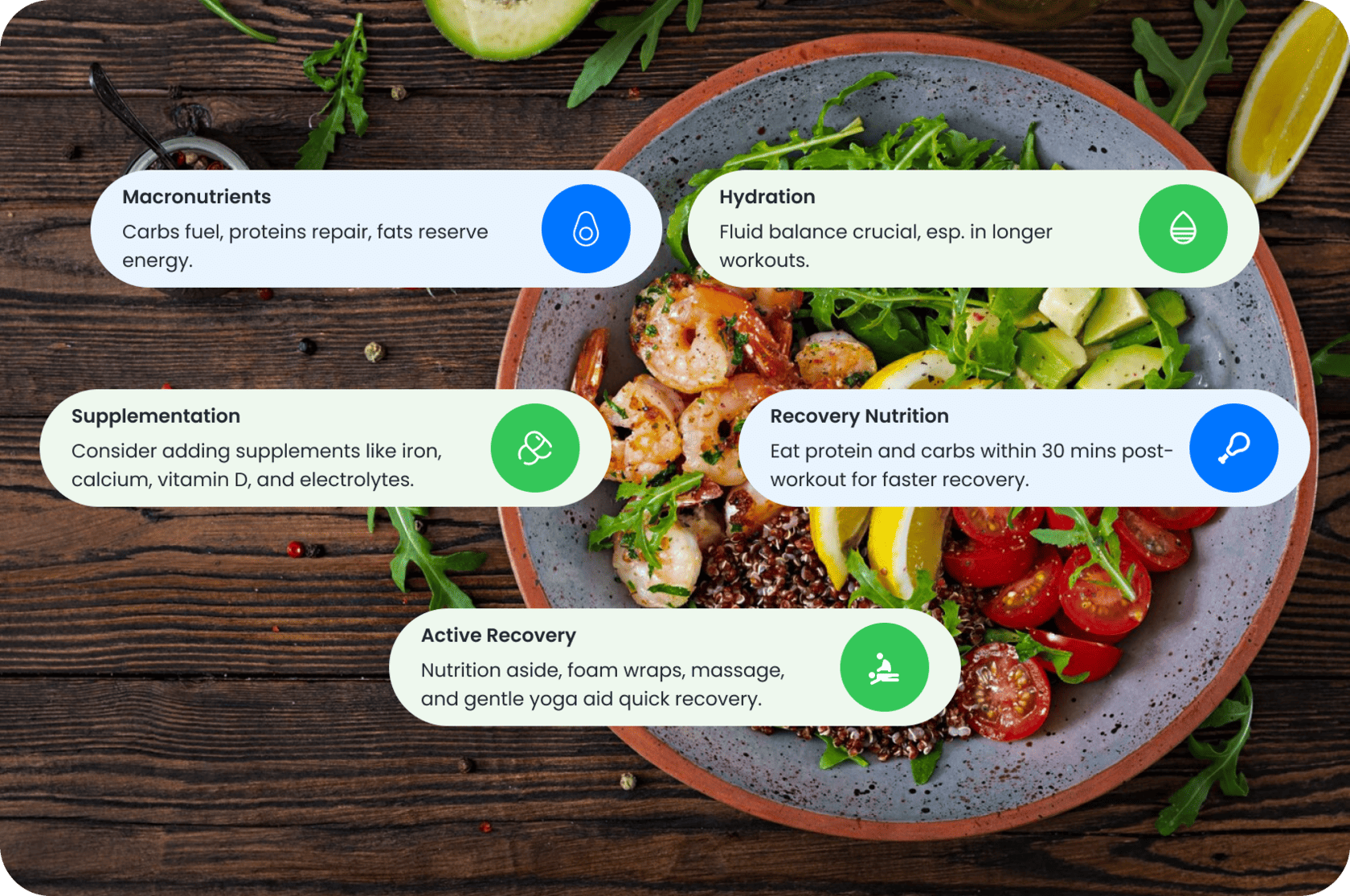Endurance athletes push limits, break barriers, and defy fatigue, but even the strongest need an extra edge. No matter if you chase a personal best in a marathon or go through your triathlon training plan for beginners, endurance sports demand more than just grit and a healthy diet. This is when endurance supplements come into play.
I must note that you should not consider supplements as a shortcut. They are rather a smart support.
From reducing fatigue from endurance exercises to speeding up recovery, the right mix can help you train harder, race stronger, and bounce back faster.
In this guide, we’ll break down the top dietary supplements that can give you that extra edge: safely, effectively, and backed by science.
Types of Endurance Supplements
International surveys found that two-thirds of 3,887 adult and adolescent elite track and field athletes participating in world championship competitions took one or more dietary supplements that contained vitamins, minerals, creatine, caffeine, and amino acids.
Notably, supplement use increased with age and was more common among women than men. This shows that supplements are widely used in elite sports. Most athletes use them to keep up with the demands of intense training and competition.
Endurance supplements come in various forms and target different physiological needs. Below is an overview of the most common types, their key ingredients, and their primary benefits.
Electrolyte Supplements
Electrolytes contain minerals like sodium, potassium, magnesium, and calcium. They help maintain hydration, prevent muscle hypertrophy, and support nerve and muscle function during long-duration, high-intensity exercise, like hill running workouts, for example.
Carbohydrate Supplements
Carbohydrate supplements include energy gels, powders, and drinks. They provide rapid energy, replenish glycogen stores, and help sustain performance in endurance sports such as running, cycling, and swimming.
These supplements are essential for activities lasting longer than 60–90 minutes, like marathons and Ironman races.
Beta-Alanine
Bera-alanine is an amino acid that increases muscle carnosine levels. It buffers lactic acid build-up, delaying muscle fatigue and allowing longer, more intense workouts. This amino acid is commonly included in pre-workout blends.
Branched-Chain Amino Acids (BCAAs) & Essential Amino Acids (EAAs)
BCAAs such as leucine, isoleucine, and valine help reduce muscle breakdown, support recovery, and decrease exercise-induced fatigue.
EAAs provide athletes with all nine essential amino acids that our body can’t produce on its own and promote muscle protein synthesis and overall endurance.
These amino acids include:
- Histidine – important for growth, tissue repair, and the production of histamine (which supports the immune system and digestion).
- Isoleucine – supports muscle metabolism, immune function, and energy regulation.
- Leucine – plays a key role in muscle repair, protein synthesis, and regulating blood sugar levels.
- Lysine – helps with calcium absorption, collagen production, and immune support.
- Methionine – supports metabolism, detoxification, and the absorption of minerals like zinc and selenium.
- Phenylalanine – helps produce neurotransmitters like dopamine and norepinephrine, which affect mood and alertness.
- Threonine – essential for healthy skin, connective tissue, and immune function.
- Tryptophan – a precursor to serotonin, which affects mood, sleep, and appetite.
- Valine – helps with energy production, muscle growth, and tissue repair.
Adaptogens
Adaptogens are natural extracts such as ashwagandha, Rhodiola, and Cordyceps mushrooms. These supplements help the body adapt to physical and mental stress, increase resilience, and improve oxygen utilization. They are popular among endurance athletes for their ability to boost overall stamina.
Creatine
Creatine supports muscle energy reserves and improves cell hydration. It enhances endurance performance in both short-term and long-term activities, aids recovery, and boosts muscle growth. Creatine for runners is typically used in powder form.
Caffeine
A well-researched stimulant that increases alertness reduces perceived exertion, and delays fatigue. Commonly included in pre-workout supplements and energy gels.
Other Key Endurance Supplements
- Zinc, Magnesium, and Vitamin B6 support muscle mass recovery, immune function, and sleep quality, which are critical for endurance athletes. Here are more insights on magnesium for athletes.
- Energy gels and chews are convenient sources of quick-digesting carbohydrates and electrolytes for use during long events like Ironman races or marathons.
- Iron and vitamin B12 are also important for endurance athletes, as they help produce healthy red blood cells that carry oxygen to working muscles during intense training and races.
- Pre-workout supplements contain blends of caffeine, beta-alanine, creatine, and nitric oxide boosters and are designed to enhance energy, focus, and endurance before exercise.
Comparison Table: Common Endurance Supplement Types

Elite Athletes and Supplements
Elite athletes often take supplements to boost athletic performance, speed recovery, and train at their best. For example, Mo Farah, a four-time Olympic gold medalist, has openly talked about using iron and vitamin D supplements to support his intense training and endurance.
Another example is Simone Biles, one of the most decorated gymnasts of all time. She’s mentioned using protein supplements to help recover after grueling training sessions.
Some athletes also rely on creatine to enhance strength and power. It’s popular among sprinters and weightlifters. In fact, Usain Bolt’s team reportedly included creatine in his regimen during peak training periods.
It is important to note that elite athletes usually work with nutritionists or sports doctors to choose safe, legal options backed by science rather than choosing the supplements themselves. To learn more about how pro athletes train, check out this elite triathlon training plan.
Clinical studies, personalized plans, and batch-tested supplements help reduce risks and make sure the focus stays on physical performance — not damage control.
Another key note to remember is that supplement rules aren’t the same everywhere.
In the U.S., for example, supplements are regulated as food, not drugs — which means they don’t need to be proven safe or effective before hitting the shelves. Meanwhile, countries like Australia and Canada have stricter rules, often requiring more testing and labeling.
For endurance athletes, this patchwork of regulations can be tricky. A supplement that’s legal in one country might be banned in another — or even by your sport’s governing body. For instance, caffeine is allowed in moderate doses, but substances like GW501516 (a performance-enhancing compound) are strictly banned worldwide.
In fact, elite athletes don’t just look at the label — they rely on expert guidance, trusted sources, and strict testing to stay competitive, stay clean, and stay safe.

How to Choose the Best Supplements for Endurance
Choosing the right supplements for endurance requires a thoughtful approach that balances your specific performance goals, nutritional needs, and safety considerations.
First, you need to identify your endurance goals and needs.
Are you focused on increasing stamina, speeding up recovery, maintaining body weight, improving hydration, or supporting muscle repair?
Consider your activity type (running, cycling, different types of triathlons, etc.), intensity, and duration, as these factors influence your supplement needs.
Then, assess your diet and nutritional gaps.
Does your regular diet meet your energy, protein, vitamin, and mineral requirements?
Supplements should fill gaps — not replace — a balanced diet, especially if you struggle to get enough nutrients from food alone during heavy training periods.
Look for supplements with proven health benefits for endurance athletes, such as:
- Carbohydrates: for sustained energy during long activities.
- Protein: for muscle repair and recovery, especially post-exercise.
- Electrolytes: to maintain hydration and prevent cramps while cycling and running.
- Beta-Alanine: to buffer muscle acidity and delay fatigue.
- Caffeine: to boost alertness and delay fatigue.
- Creatine: for increased muscle energy and improved recovery.
- Omega-3s/Fish Oil: for joint, heart, and cognitive health.
- Iron supplementation: to support oxygen transport, especially if you are at risk for deficiency.
Select products with high-quality, natural ingredients and avoid excessive fillers or artificial additives.
Ensure dosages align with scientific research and your personal requirements. For example, creatine loading phases often use 20g per day initially. We talk about it more in our article about creatine for runners.
Before taking any supplements, check for allergens, dietary restrictions (vegan, gluten-free, etc.), and any specific ingredient sensitivities. Always discuss new supplements with your doctor, triathlon coach, or sports nutritionist, especially if you have medical conditions, take medications, or are unsure about dosages.
Track your performance, recovery, and any side effects after starting a supplement. Adjust your regimen based on how you feel and feedback from your healthcare provider.

Conclusion: Role of Supplements in Endurance Athletes’ Performance
Supplements can be a powerful ally for endurance athletes — but they’re not a magic fix.
To truly benefit, it’s important to weigh the pros and cons, choose wisely, and use them to support (not replace) a solid training and nutrition plan.
Before adding anything new to your routine, talk to a healthcare professional who understands the role of supplements in sports performance benefits.
They can help you find the right supplements based on your goals, training intensity, and overall health.
And remember — real progress starts with smart training, quality sleep, balanced meals, and sticking to the triathlon training plan. Supplements are just the boost that helps take all that hard work even further.



